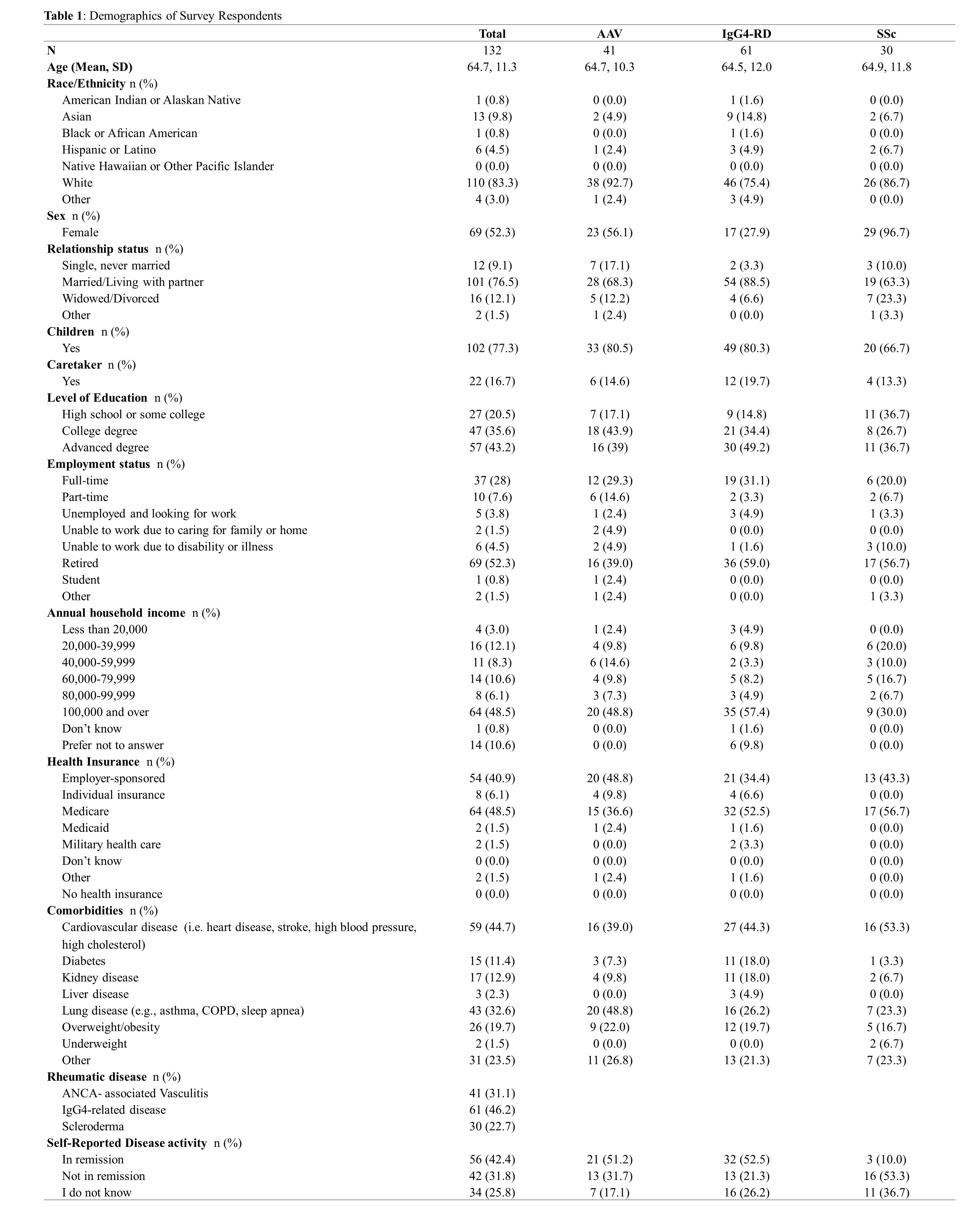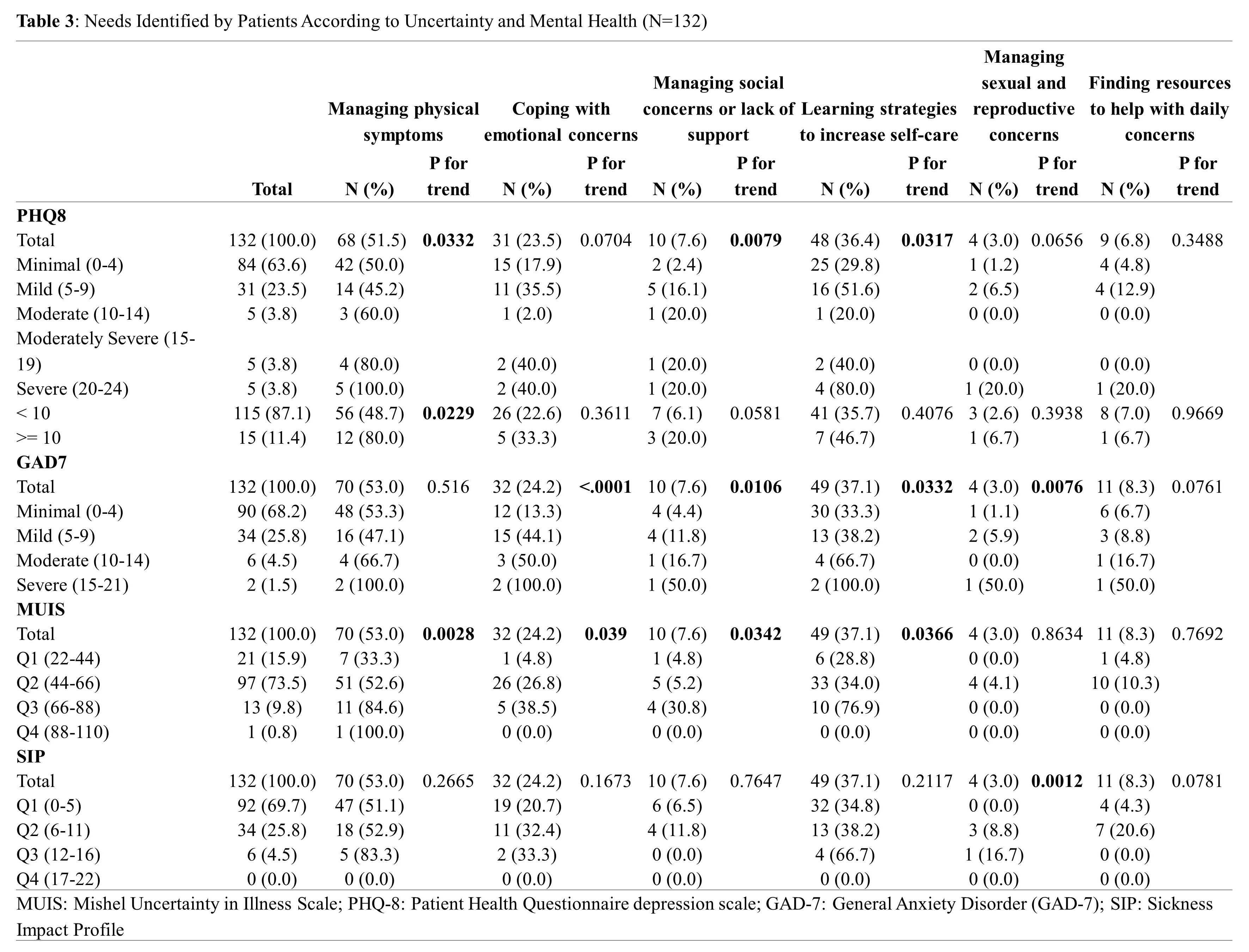Session Information
Date: Monday, November 8, 2021
Title: Epidemiology & Public Health Poster III: Other Rheumatic & Musculoskeletal Diseases (1022–1060)
Session Type: Poster Session C
Session Time: 8:30AM-10:30AM
Background/Purpose: Patients with systemic autoimmune rheumatic diseases (SARDs) face uncertainty regarding disease flare or progression, management, how to interpret physiologic changes in their bodies, and new roles, including when and how to engage in medical visits and tests. ANCA-associated vasculitis (AAV), systemic sclerosis (SSc), and IgG4-related disease (IgG4-RD) are prototypic SARDs with differing treatments, natural histories, and manifestations that may lead to differences in the impact of illness-related uncertainty. Little is known about the psychological profiles and psychosocial and health needs of illness-related uncertainty among adults with these unique SARDs.
Methods: We invited English-speaking patients with AAV, SSc, and IgG4-RD from a single center to participate. Participants provided details of sociodemographics and SARD history and completed surveys: Mishel Uncertainty in Illness Scale (MUIS, (range 22-110), Patient Health Questionnaire depression scale (PHQ-8, range 0-12), General Anxiety Disorder (GAD-7, range 0-21), Sickness Impact Profile (SIP, range 0-22), and a survey of psychosocial needs. Participants could complete surveys by paper, electronically, or by phone. We assessed the correlation of MUIS with PHQ-8, GAD-7, and SIP using Pearson’s correlation coefficient. The association of psychological measures with self-reported needs were assessed using P-for-trend analyses. A two-sided p-value < 0.05 was considered significant.
Results: Of 368 patients invited, 132 (36%) with AAV (41, 31%), IgG4-RD (61, 46%), or SSc (30, 23%) participated (Table 1). The mean (SD) age was 65 years (11) and the majority (n=69, 52%) were female and white (n=110, 83%). Fifty-six (42%) reported remission and 42 (32%) active disease. The median [IQR] MUIS, PHQ-8, GAD-7, and SIP scores were 55.0 [48.0, 62.0], 3.0 [1.0, 6.0], 2.0 [0.0, 5.5], and 1.0 [0.0, 6.0]; 46 (35%) had at least mild depression and 42 (32%) had at least mild anxiety. We observed variations in these measures across SARDs. Across the full sample, illness-related uncertainty was positively correlated with depression (PHQ-8, r=0.43, p=< 0.0001), anxiety (GAD-7, r=0.33, p= < 0.0001), and sickness impact (SIP, r=0.28, p=0.001). We further observed variations in these measures across SARDs, such that uncertainty was more strongly associated with depression and sickness impact for individuals with AAV or SSc as compared to individuals with IgG4-RD (Table 2). Most commonly, patients endorsed needing help with physical symptoms (n=70, 53.0%), emotional concerns (n=32, 24.2%), and strategies to increase self-care (n=49, 37.1%), with greater needs significantly positively correlated with illness-related uncertainty (Table 3).
Conclusion: For rheumatology patients with prototypic SARDs, illness-related uncertainty is a significant correlate of levels of depression, anxiety, and sickness impact, as well as their chief psychosocial needs. Considering the relatively stronger associations among patients with AAV and SSc rather than IgG4-RD, there may be key differences in natural history and needs for targeted interventions to address uncertainty and patient-reported needs.
To cite this abstract in AMA style:
Wallace Z, Cook C, Finkelstein-Fox L, Fu X, Castelino F, Choi H, Perugino C, Stone J, Park E, Hall D. The Association of Patient Uncertainty with Mental Health in Systemic Autoimmune Rheumatic Diseases [abstract]. Arthritis Rheumatol. 2021; 73 (suppl 9). https://acrabstracts.org/abstract/the-association-of-patient-uncertainty-with-mental-health-in-systemic-autoimmune-rheumatic-diseases/. Accessed .« Back to ACR Convergence 2021
ACR Meeting Abstracts - https://acrabstracts.org/abstract/the-association-of-patient-uncertainty-with-mental-health-in-systemic-autoimmune-rheumatic-diseases/



